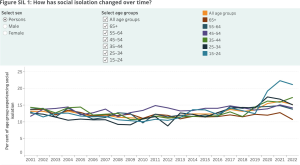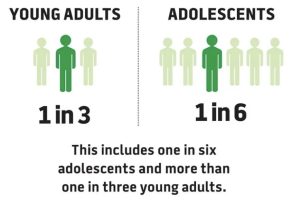
A Silent Epidemic
Margaret, 45, lives alone in the suburbs of Sydney. On some days, she doesn’t utter a single word. There are no visits from family, no casual chats, no social interaction—just silence.
She is not alone.
Loneliness has quietly become one of the most serious but overlooked public health problems in Australia. From international students to retired elders, millions of people live in this increasingly fast-paced yet emotionally alienated society. Studies have confirmed that loneliness is associated with depression, heart disease and premature death. However, this problem is still ignored by the media and policymakers.
The data is alarming. The 2023 report of the Australian Institute for Health and Welfare (AIHW) shows that social isolation affects people of all ages and backgrounds. A 2025 study by the University of Sydney found that long-term loneliness doubles the risk of premature death for women. Meanwhile, the VicHealth2023 Youth Survey shows that among all Australians, one in every three often feels lonely.


The Invisible Toll: Who Feels It the Most?
1. Older Adults: The Forgotten Community
For many older Australians, retirement doesn’t bring freedom—it brings isolation. There is a video on YouTube that profoundly presents the lonely and neglected life state of retired elderly people.
Helen, 72, a retired Sydney resident, says that after her husband’s death, the silence in her home became overwhelming. Her children visit only about once a month, and her television often serves as her only companion. Sometimes, she goes days without a real conversation.
Gerontologist Dr. James Carter notes that ageing often comes with a loss of social connections due to bereavement, declining mobility, and reduced family engagement. He warns that unchecked loneliness can accelerate cognitive decline in the elderly.
2. Young People: The Loneliest Generation?

Contrary to popular belief, young Australians aged 18–35 are among the most affected. VicHealth’s 2023 study revealed that 50% of young people feel lonely at least once a week.
Sarah, a 24-year-old university student, shares: “Everyone’s so busy—or only online. I’ve got hundreds of Instagram followers, but no one to grab coffee with. Pretending everything’s okay is exhausting.”
Dr. Muireann Irish, a psychology professor at the University of Sydney, explains that as people age, social interactions become more challenging. She notes that long-term isolation is linked to cognitive decline, memory impairment, and even increased risk of dementia.
3. International Students and Migrants: Isolation Far from Home
For international students, loneliness is often compounded by cultural differences and financial stress. A 2016 Monash University study found that 60% of overseas students experienced significant loneliness.
Scarlett, a 20-year-old student from China, says: “Back home, I was always surrounded by family. Here, it’s just study, work, sleep. Making Australian friends is harder than I thought.”
Why Loneliness is a Health Crisis
The quality and quantity of our social relationships are directly linked to both mental and physical health (Cacioppo & Cacioppo, 2010). Loneliness is not just an emotional state—it’s a physiological threat.
Public health expert Dr. Lisa Chen explains: “Loneliness triggers chronic stress responses, leading to elevated cortisol levels. Over time, this fight-or-flight state harms nearly every organ system.”
Recent studies show that loneliness increases the risk of heart attacks by 29%, and in older adults, it significantly raises the chances of developing dementia. It also weakens the immune system, making the body more vulnerable to infections. In terms of mortality, its impact is comparable to smoking or obesity.
Breaking the Cycle: What Can Be Done?
Loneliness has become an increasingly serious social problem in Australia. It not only affects an individual’s mental health, but may also lead to social isolation, forming a vicious circle that is hard to break. To solve this problem, we need to make joint efforts at the levels of individuals, communities and the government.
First of all, from an individual perspective, we need to help people enhance their self-awareness and social skills, and strengthen their psychological resilience in the face of loneliness. Through mental health education and related support, encourage everyone to proactively establish and maintain genuine interpersonal relationships instead of overly relying on virtual social platforms.
Secondly, at the community level, more places and opportunities to promote people’s communication should be created. For instance, community activities or interest groups can all enhance the connections among people and build a good circle of interpersonal relationships. Meanwhile, the community can optimize the design of public Spaces to make it easier for people to communicate and interact naturally in their daily lives.
Finally, at the government and institutional levels, special policies need to be introduced to focus on the issue of loneliness. Drawing on the experience of countries such as the United Kingdom, positions specifically responsible for the issue of loneliness can be established, and the investment and popularization of mental health services can be strengthened. Meanwhile, integrate the concept of promoting interpersonal communication into urban planning and workplace management to create a more inclusive social environment.
Conclusion
Loneliness is not an individual weakness but a health crisis for society. Just like the campaigns we launched against smoking or obesity, eliminating loneliness requires comprehensive public policies, active community participation and long-term continuous investment. This is a complex issue that affects people of different ages and backgrounds, and it requires coordinated response measures.
Psychologist Dr. Harris warns: “If we don’t rebuild real human connections, loneliness could become a more dangerous epidemic than the flu in the next decade.” His words highlight the urgency for immediate action, as the consequences of isolation reach far beyond emotional pain, impacting physical health and societal wellbeing.
In our super-connected era, the most fundamental human needs – warmth, attention and true care – remain unmet for too many people. True change begins with each and every one of us, but it requires the joint efforts of governments, communities and the healthcare system to truly weave a more interconnected and compassionate society that supports the mental and emotional well-being of everyone.
(Word count:1014)
Reference
Cacioppo, J. T., & Cacioppo, S. (2010). Social relationships and health: The toxic effects of perceived social isolation. PLOS Medicine, 7(11), e1000316. https://doi.org/10.1371/journal.pmed.1000316
Beaumont, S. (2023, January 15). Loneliness: The new epidemic [Video]. YouTube. https://www.youtube.com/watch?v=JFQPEohSMAM
The City Journal. (2023, October 15). International students’ wellbeing overlooked by universities. The City Journal.
https://thecityjournal.net/news/international-students-wellbeing-overlooked-universities/
Australian Institute of Health and Welfare. (2023, October 12). Social isolation and loneliness. Australian Government.
https://www.aihw.gov.au/mental-health/topic-areas/social-isolation-and-loneliness
VicHealth. (2023). The Young Australian Loneliness Survey.
Australian Institute of Health and Welfare. (2024). Australia’s health 2024: Topic summaries.
https://www.aihw.gov.au/getmedia/ac10875a-dab5-4552-942b-f9e120c7fac3/ah24-topic-summaries.pdf





Be the first to comment